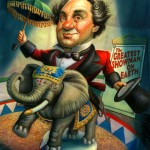 The New Atheists are much too shrill for my decidedly agnostic tastes. In many respects, they are on a hiding to nothing. The religious impulse will always be with us and so will be a belief in the supernatural. But not all atheists are new atheists: It’s also quite possible for an atheist to admire much of the structure, cohesion and sense of tradition that some religions bring to society, not to speak of the happiness they can bring to many of their adherents.
The New Atheists are much too shrill for my decidedly agnostic tastes. In many respects, they are on a hiding to nothing. The religious impulse will always be with us and so will be a belief in the supernatural. But not all atheists are new atheists: It’s also quite possible for an atheist to admire much of the structure, cohesion and sense of tradition that some religions bring to society, not to speak of the happiness they can bring to many of their adherents.
Nevertheless these comments by Alain de Botton, an atheist playing nice, go too far:
The starting point of religion is that we are children, and we need guidance. The secular world often gets offended by this. It assumes that all adults are mature – and therefore, it hates didacticism, it hates the idea of moral instruction.
Oh come on: I suspect that there are many secular folk who are very far from convinced that “all adults are mature”.
De Botton continues:
But of course we are children, big children who need guidance and reminders of how to live. And yet the modern education system denies this. It treats us all as far too rational, reasonable, in control.
Really? Has he any idea about the stifling speech codes, the numbskull impositions of zero tolerance, and, to name just one more example, the endless environmentalist nagging that pollute today’s schools and universities.
Wait, there’s more:
We are far more desperate than secular modernity recognizes. All of us are on the edge of panic and terror pretty much all the time – and religions recognize this.
Who is this “all”, I wonder? I do agree that religions recognize that profound anxiety can be part of the human condition. But then so do pharmaceutical companies, and for many people their remedies will be a better route to take, either with the additional help of religion, or without.
De Botton:
Religions are fascinating because they are giant machines for making ideas vivid and real in people’s lives: ideas about goodness, about death, family, community etc. Nowadays, we tend to believe that the people who make ideas vivid are artists and cultural figures, but this is such a small, individual response to a massive set of problems. So I am deeply interested in the way that religions are in the end institutions, giant machines, organizations, directed to managing our inner life. There is nothing like this in the secular world, and this seems a huge pity.
A pity? Nope, I would say that it is a cause for celebration. There was plenty of talk about engineering the soul back in the old Bolshevik days. No-one needs that lot back in town. For those who are looking for the sort of guidance de Botton is discussing, but who believe that the religious route is not for them, there are many other places to look, from family, to tradition, to history, you name it. But to be able to look in that way does require a broadly rational education. And a broadly rational education ought never to deny our own immense capacity (for good or bad) for irrationality.
H/t: Andrew Sullivan
 Via Think Progress (I know, I know), here’s Rick Santorum explaining why a woman left pregnant should be compelled to give birth:
Via Think Progress (I know, I know), here’s Rick Santorum explaining why a woman left pregnant should be compelled to give birth: 





